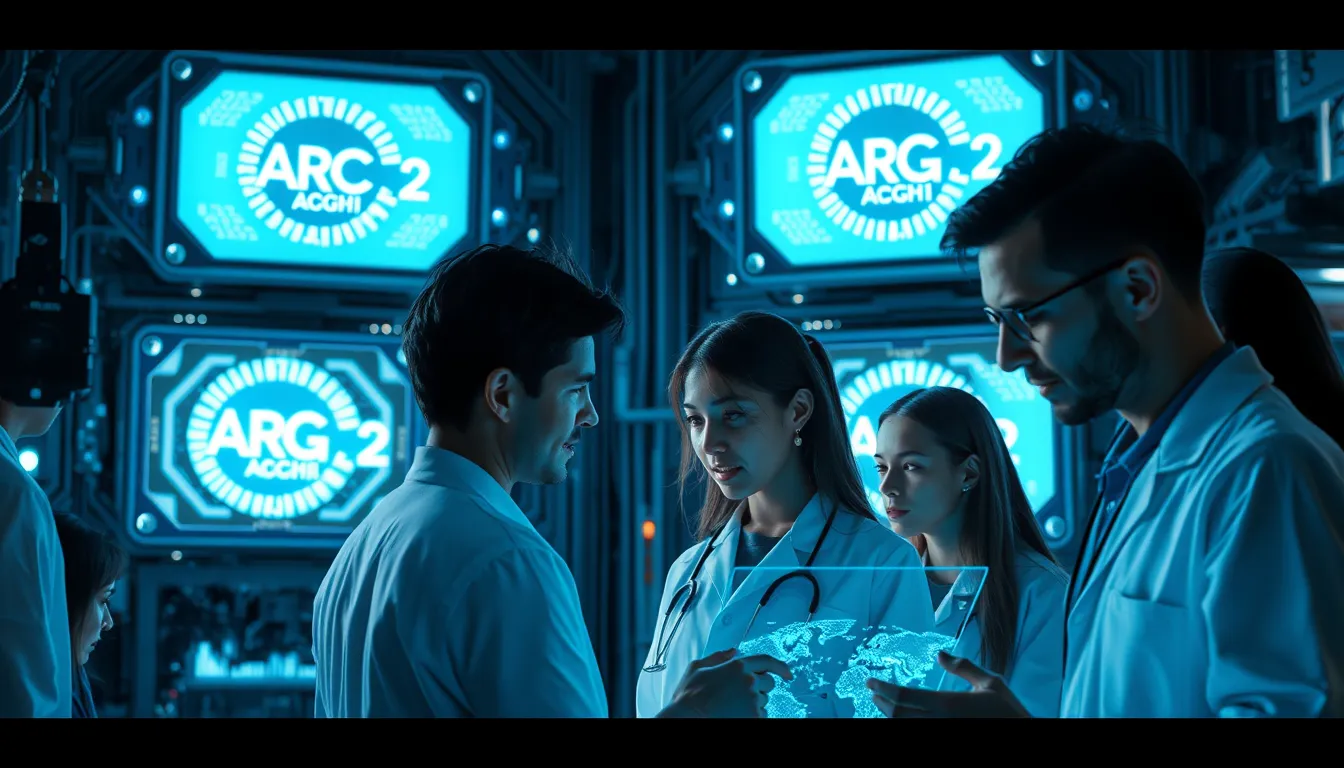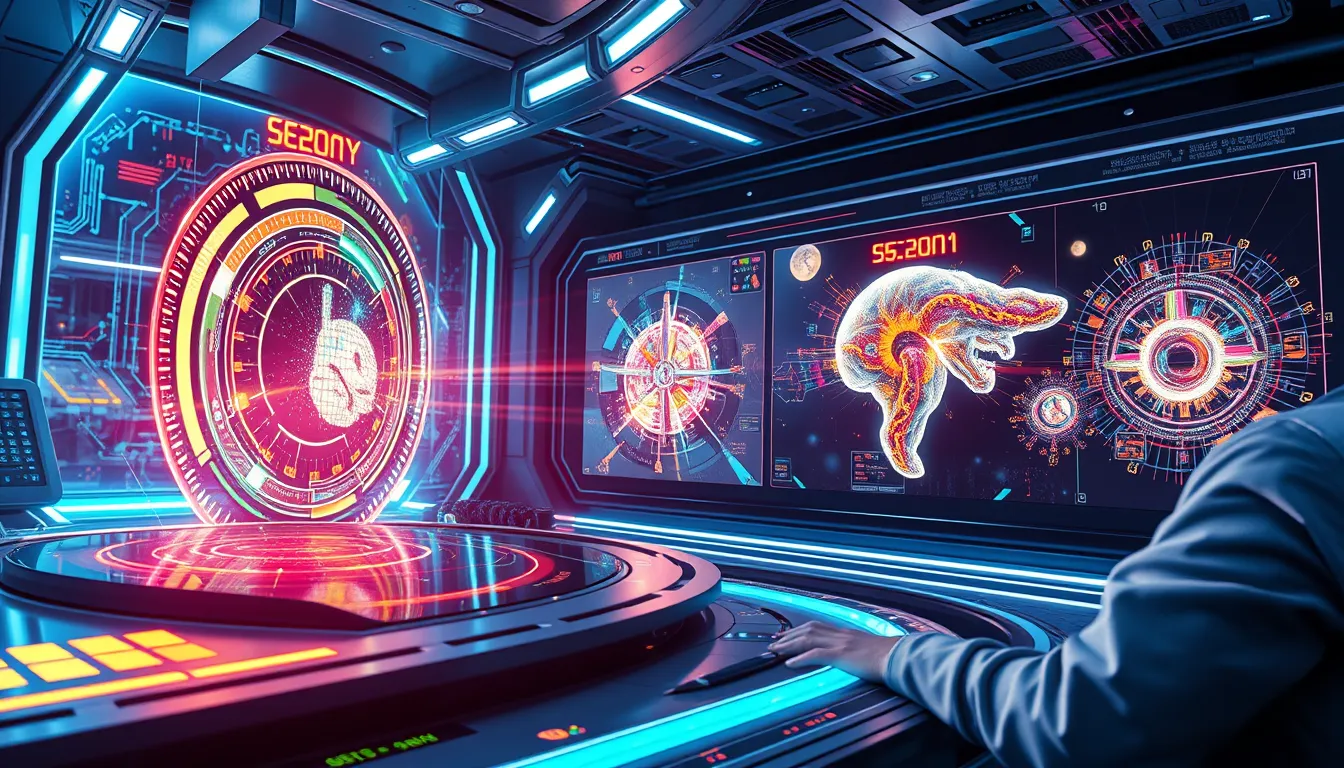Now Reading: ARC-AGI-2 Benchmark: Elevating AI General Intelligence
-
01
ARC-AGI-2 Benchmark: Elevating AI General Intelligence
ARC-AGI-2 Benchmark: Elevating AI General Intelligence

ARC-AGI-2 Benchmark: Elevating AI General Intelligence
Introduction
The landscape of Artificial Intelligence is evolving at an unprecedented pace, and benchmarks play an essential role in measuring and guiding this progression. The ARC Prize has recently introduced the ARC-AGI-2 benchmark—a groundbreaking tool designed to stretch the limits of AI systems. This new standard evaluates various facets of AI, particularly focusing on general intelligence and complex reasoning. By challenging the status quo, the ARC-AGI-2 benchmark not only fosters innovative thinking but also inspires global research teams to push the boundaries of what AI can achieve. This article will explore the origins, implications, and far-reaching impact of this transformative benchmark on the future of AI.
The ARC Prize: An Agent of Transformation
The ARC Prize, renowned for its visionary approach to advancing AI technology, serves as a catalyst for innovation in the field. It acts as a critical and inspiring force that sets high standards for evaluating advanced AI solutions. Over the years, the ARC Prize has recognized numerous breakthroughs and has been pivotal in creating benchmarks that reflect real-world challenges. With the introduction of the ARC-AGI-2 benchmark, the ARC Prize aims to elevate AI general intelligence to new heights by establishing rigorous evaluation parameters.
The Significance of High-Standard Benchmarks
Benchmarks such as the ARC-AGI-2 play a crucial role in shining a light on the strengths and weaknesses of AI systems. In a field that is continuously seeking to move from narrow task-specific intelligence towards a broader, more adaptable form of cognitive ability, having a robust benchmark is essential. This type of evaluation not only assists in highlighting the advances in the field but also helps in identifying areas that require further refinement. For AI developers and researchers, benchmarks are an indispensable tool for comparing their innovations against recognized standards, fostering an environment of continuous improvement.
Unpacking the ARC-AGI-2 Benchmark
The ARC-AGI-2 benchmark represents a significant step forward in the evolution of AI evaluation. Unlike previous benchmarks that may have focused solely on specific tasks, the ARC-AGI-2 sets out to assess a wider spectrum of cognitive abilities. It does so by putting AI systems through a series of tests designed to evaluate general intelligence and the capacity for advanced reasoning. Below, we outline some of the key components that make this benchmark both innovative and challenging:
- Rigorous Evaluation of AI General Intelligence: The benchmark is meticulously designed to measure not only performance on predefined tasks but also the adaptability of AI systems in transferring knowledge across various domains. This holistic approach ensures that AI is tested on its ability to think broadly and apply learned concepts in novel situations.
- Promotion of Advanced AI Solutions: The ARC-AGI-2 benchmark is established to be a driving force behind the development of more sophisticated and versatile AI technologies. By encouraging the design of algorithms capable of complex reasoning, the benchmark pushes research teams towards creating solutions that can thrive in multifaceted, real-world environments.
- Addressing Complex, Real-World AI Challenges: The tests incorporated into the ARC-AGI-2 are designed to simulate real-life problems, which necessitate not only technical competence but also ingenuity and adaptability. This focus ensures that AI systems are not just proficient in controlled settings but are also capable of handling unpredictable and dynamic scenarios.
Technical Overview of the ARC-AGI-2 Benchmark
Evaluating General Intelligence
A major goal of the ARC-AGI-2 benchmark is to evaluate how far current AI systems have come in approximating general intelligence. General intelligence in AI refers to the ability to understand, learn, and apply knowledge across a wide range of tasks, much like human cognition. The benchmark achieves this by exposing AI systems to challenges that require a combination of reasoning, learning, and adaptation. For instance, tests might include problem-solving tasks that are not limited to specific domains but span diverse fields such as linguistics, mathematics, and abstract reasoning.
The multi-faceted approach of the ARC-AGI-2 ensures that systems are not overly optimized for narrow tasks. Instead, they must demonstrate flexibility and a broad understanding that more closely mirrors general intelligence. This is a critical step toward developing AI systems that can operate effectively in unpredictable real-world settings where challenges do not come neatly packaged into standardized tasks.
Emphasis on Complex Reasoning
One of the standout features of the ARC-AGI-2 benchmark is its focus on complex reasoning. Modern AI systems have shown remarkable proficiency in pattern recognition and data processing, yet the ability to perform sophisticated reasoning remains a significant challenge. The benchmark addresses this gap by incorporating tasks that require a deep understanding of relationships, scenarios, and abstract concepts. These tasks are carefully calibrated to test the AI’s ability to not only process information but also to draw logical inferences and craft reasoned responses.
For example, an AI might be presented with a series of interrelated problems that require understanding cause and effect, making predictions, or planning several steps ahead. This level of reasoning is essential for developing AI that can serve in high-stakes decision-making contexts, such as autonomous vehicles, strategic planning, or healthcare diagnostics.
Integration with Real-World Data and Scenarios
Another significant aspect of the ARC-AGI-2 benchmark is its grounding in real-world challenges. By integrating actual data and scenarios into its testing modules, the benchmark ensures that AI systems are evaluated in contexts that closely mimic practical applications. This not only enhances the relevance of the testing process but also provides valuable insights into how AI might perform outside of the controlled laboratory environment.
The real-world applications of the benchmark are vast. Whether it be in the realm of robotics, financial modeling, or even creative arts, the ability to process unforeseen inputs and react appropriately is essential for the next generation of intelligent systems. By benchmarking systems in this manner, the ARC-AGI-2 helps bridge the gap between theoretical development and practical implementation.
The Broader Impact on AI Research and Development
Fostering a Competitive and Collaborative Research Environment
Benchmarks often serve as a rallying point around which the research community can align its goals. The ARC-AGI-2 benchmark is no exception. It creates a common standard that researchers and developers can use to assess their progress, fostering a spirit of both competition and collaboration. In competitive scenarios, teams strive to refine their algorithms and improve performance based on benchmark feedback. Simultaneously, the shared challenges encourage collaborative problem-solving, where breakthroughs in one area can benefit the community as a whole.
Accelerating the Pace of Technological Innovation
By providing a clear target for what constitutes significant progress in AI, the ARC-AGI-2 benchmark accelerates the pace of innovation. When research teams understand the criteria for success, they can focus their efforts on the most critical aspects of AI development. This clarity of purpose streamlines research, reduces redundant efforts, and channels resources toward tackling the most pressing challenges in AI. Ultimately, this leads to faster breakthroughs and the development of more robust and capable AI systems.
Enhancing Transparency and Accountability in AI
In recent years, transparency and accountability have become central themes in discussions about AI ethics and governance. The ARC-AGI-2 benchmark contributes to this dialogue by establishing clear, measurable standards for AI performance. These standards allow stakeholders—including developers, policymakers, and the general public—to assess how well AI systems are performing relative to established benchmarks. This transparency is crucial for building trust in AI technologies, ensuring that advancements are not only impressive in laboratory settings but are also reliable and safe when deployed in real-world environments.
Encouraging Interdisciplinary Approaches
The challenges addressed by the ARC-AGI-2 benchmark are inherently interdisciplinary, requiring insights from computer science, cognitive psychology, neuroscience, and even philosophy. By setting ambitious goals for AI performance, the benchmark encourages collaboration across these disciplines. Researchers are motivated to draw upon diverse perspectives to tackle complex problems, leading to more innovative and holistic solutions. This interdisciplinary approach is likely to yield new theoretical frameworks and practical applications that can benefit a wide array of sectors.
Comparative Analysis: ARC-AGI-2 Versus Previous Benchmarks
It is worthwhile to compare the ARC-AGI-2 benchmark with previous attempts to standardize AI evaluation. Earlier benchmarks often focused on isolated tasks, such as image recognition or natural language processing. While these benchmarks provided valuable insights, they sometimes fell short of measuring an AI’s overall capability to deal with the intricacies of human-like reasoning. In contrast, the ARC-AGI-2 benchmark represents a paradigm shift. Its comprehensive approach not only tests for task-specific efficiency but also for the underlying cognitive abilities that are essential for genuine general intelligence.
Many prior benchmarks were limited by their narrow scope. They excelled in assessing performance under controlled conditions but failed to capture the multifaceted nature of intelligence. The ARC-AGI-2 benchmark overcomes this limitation by integrating various cognitive tasks into a single comprehensive framework. This integration helps uncover deficiencies that might remain hidden under narrower testing regimes and highlights areas that require further refinement in AI algorithms.
By comparing performance across these diverse benchmarks, researchers can better understand the evolution of AI technology over time. The ARC-AGI-2 benchmark sets a higher bar for innovation, ensuring that future advancements in AI are not only incremental improvements but represent meaningful progress toward the development of truly intelligent systems.
Real-World Applications and Future Prospects
Autonomous Systems and Robotics
In the domain of robotics and autonomous systems, the ability to adapt to dynamic and unpredictable environments is paramount. The ARC-AGI-2 benchmark evaluates not only an AI’s ability to process information but also its capacity to engage in forward-thinking and situational awareness. Self-driving cars, unmanned aerial vehicles, and service robots could all benefit from insights provided by the benchmark. By ensuring that AI systems are well-equipped with general intelligence, developers can create technologies that are safer, more reliable, and better able to interact with their surroundings.
Healthcare and Medical Diagnostics
AI has already made significant inroads in healthcare, from diagnostic imaging to predictive analytics. The general intelligence and complex reasoning skills measured by the ARC-AGI-2 benchmark could further enhance these applications. For instance, an AI system that performs well on this benchmark might be better suited to analyze multifaceted patient data, recognize subtle trends, and assist doctors in formulating treatment plans. The promise of improved diagnostic accuracy and personalized patient care is a compelling reason for continued investment in robust AI evaluation methodologies.
Financial Modeling and Decision Making
In finance, the ability to predict market trends and assess risk is critical. AI systems backed by the rigorous evaluation standards of the ARC-AGI-2 benchmark can help institutions develop models that are not only data-driven but also capable of reasoning through complex market dynamics. By leveraging this new benchmark, financial analysts and institutions can build more robust predictive models, ultimately leading to more informed decision-making processes in an ever-changing economic landscape.
Education and Interactive Technologies
The benefits of enhanced AI general intelligence extend into the realm of education and interactive technologies. Intelligent tutoring systems, personalized learning platforms, and adaptive educational software all stand to gain from AI systems that can reason and adapt across a broad spectrum of challenges. The ARC-AGI-2 benchmark helps ensure that these systems are evaluated on their ability to truly understand and respond to diverse educational needs, paving the way for more effective and engaging learning experiences.
The Road Ahead: Research and Policy Implications
Looking forward, the impact of the ARC-AGI-2 benchmark will likely inspire further innovation in AI research. By establishing a clear and comprehensive standard, the benchmark creates a roadmap for future developments in AI general intelligence. Research initiatives can now be more strategically aligned with these goals, maximizing the potential for breakthroughs across industries. Additionally, policymakers and industry leaders can use the benchmark to frame discussions around AI safety, ethics, and governance, ensuring that technological advancements are matched with robust regulatory frameworks.
Conclusion
The ARC-AGI-2 benchmark is a transformative initiative that elevates the evaluation of AI general intelligence to a new level. It does so by challenging AI systems with rigorous tests designed to assess both general intelligence and advanced reasoning. The benchmark serves as a crucial tool in the continual evolution of AI, inspiring research teams worldwide and pushing technological boundaries.
From its origins as part of the visionary ARC Prize to its comprehensive and challenging evaluation framework, the ARC-AGI-2 benchmark has set a new gold standard for understanding and improving AI capabilities. As AI systems become more deeply integrated into various aspects of modern life—from autonomous systems and healthcare to financial modeling and education—the insights provided by this benchmark will be invaluable. By ensuring that AI technologies are not just proficient, but truly adaptable and intelligent, the ARC-AGI-2 benchmark is paving the way for a future where artificial intelligence can meet the complex and dynamic demands of the real world.
In summary, the ARC-AGI-2 benchmark is more than just another test—it is a milestone in the journey toward realizing AI that can not only mimic human intelligence but also innovate and adapt in ways previously thought impossible. As research teams continue to refine AI systems in response to this benchmark’s challenges, we stand on the precipice of groundbreaking advances that could redefine our understanding of intelligence in the digital age.
For those interested in further insights into AI system evaluation or seeking more in-depth academic resources, additional information is available via internal publications and external research outlets. The ongoing dialogue between researchers, developers, and policymakers will be crucial in harnessing the full potential of AI technologies—and the ARC-AGI-2 benchmark is at the forefront of this exciting evolution.
The future of AI is bright, and with benchmarks like ARC-AGI-2 leading the charge, we are well-equipped to tackle both the technical and ethical challenges that lie ahead. As the field continues to mature, embracing comprehensive evaluation frameworks will be essential in ensuring that AI systems not only meet but exceed expectations in delivering real-world value.

























